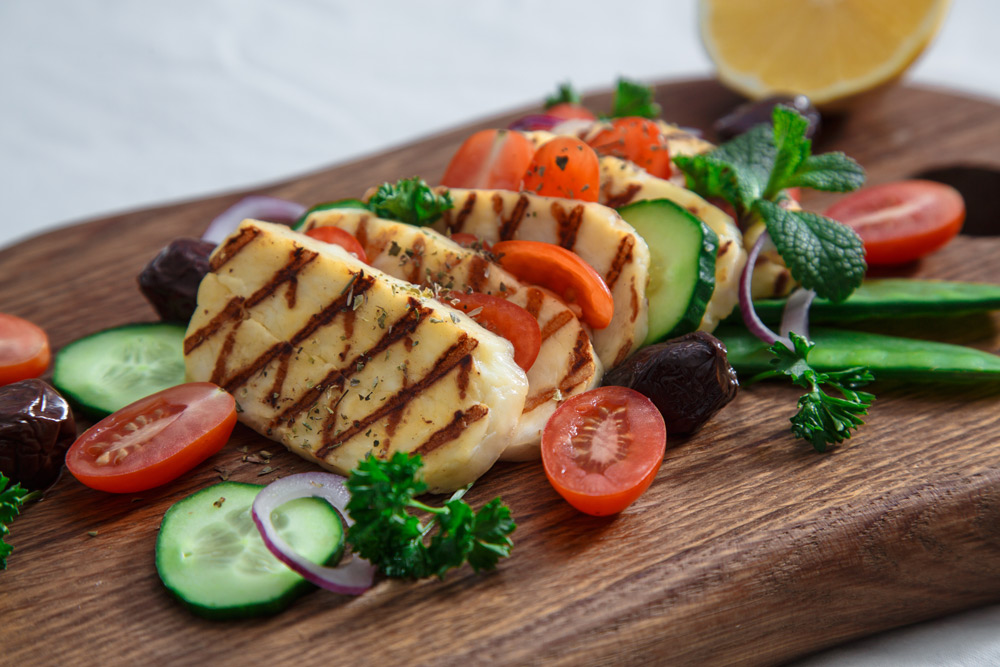Grilled Halloumi Over Salad Recipe, Spotlight on Cheeses That Can Take the Heat, When to Wash Veggies and The Link Between Exercise and Sleep
Who doesn’t love a gooey grilled-cheese sandwich? But what can you do when you want cheesy goodness without the bread? The delicious answer is cheese varieties that hold their shape under heat.
GRILLED HALLOUMI OVER SALAD
 Grilled Halloumi Over Salad
Grilled Halloumi Over SaladI’m a huge fan of halloumi, a brined goat’s milk cheese from Cyprus. Because it has a high melting point, this firm, somewhat salty cheese can be grilled directly on the grate. You can skewer chunks along with your favorite veggies or simply grill slices and serve them with the refreshing seasonal salad in this recipe.
Ingredients
- 4 tablespoons extra virgin olive oil, divided
- 1 tablespoon best-quality red wine vinegar
- 1 teaspoon fresh oregano, chopped, or 1/2 teaspoon dried oregano
- Kosher salt to taste
- Freshly ground black pepper to taste
- 8 ounces cherry tomatoes, halved
- 1 cucumber, diced
- One head romaine lettuce, washed, dried, and torn
- 12 brined Kalamata olives, drained, pitted, and halved
- 1/2 cup loosely packed flat-leaf parsley, coarsely chopped
- 12 ounces of halloumi, cut crosswise into 1/3-inch-thick slices
- 4 tablespoons Greek yogurt (optional)
Directions
Step 1
Make the salad: In a bowl, whisk together 2 tablespoons of the olive oil, the red wine vinegar, oregano, salt, and pepper. Add the tomatoes, cucumber, lettuce, olives, and parsley. Toss gently to coat the vegetables with the dressing and divide evenly on four plates.
Step 2
Pour the rest of the olive oil onto a rimmed sheet pan and gently coat both sides of each cheese slice. On a medium-hot grill, grill the cheese for 1 to 2 minutes per side, turning with tongs or a thin-bladed spatula. (Work in batches if necessary.)
Step 3
Top each salad plate with equal amounts of the grilled cheese and add a dollop of yogurt, if desired. Serve immediately.
Yields 4 servings.

Healthy Ingredient Spotlight
More Cheeses That Can Take the Heat
Halloumi isn’t the only fresh, semi-firm cheese that can be cooked without melting. Another great one is paneer, the cheese used in Indian cuisine, most famously the creamy spinach dish saag paneer. It’s readily available at many markets, not just specialty shops. And from frigid Finland comes leipäjuusto, popular there at breakfast, according to the experts at the magazine Culture: The Word on Cheese. These cheeses will soften when grilled, but they won’t break down and melt thanks to their low acid content. That’s also the reason you may hear a squeaking sound as you bite into them!

Healthy Kitchen Nugget
When Exactly to Wash Veggies
While most concern over food contamination centers on raw meat, vegetables as well as fruits can have organisms you want to keep out of the kitchen. Here are some tips from the FDA and the University of Maine Cooperative Extension to stay safe.
Start by choosing produce that isn’t bruised or damaged. If shopping for precut foods, like fruit chunks or bags of lettuce, make sure they’ve been kept refrigerated or on ice at the store, and get them into the fridge as soon as you get home. If a food gets marred before you’ve had a chance to use it, cut off the affected areas before preparing or eating it.
There are also steps to take with freshly harvested produce, whether from your own garden or a farmers’ market. Washing off produce can help reduce microorganisms. There’s no need to use soap or a special produce wash—just gently rub the produce while holding it under plain running water. Do make sure the water is no more than 10 degrees Fahrenheit colder than the food, or else any pathogens could get drawn in through the stem (if there is one). Because excess water can lead to faster molding or rotting, be sure to thoroughly dry your produce with clean paper towels before storing it in the fridge. To store produce without washing it first, shake, rub, or brush off any garden dirt with either a clean, soft brush or a clean, dry paper towel before you bring it inside if possible. Then place the produce in a plastic bag or container to prevent any risk of contamination to other foods in your fridge. For a list of which produce should be washed and which produce should be wiped clean, check out this resource page from the University of Maine Cooperative Extension.
Always rinse produce right before you peel or cut it so that any dirt and bacteria aren’t picked up by your knife and transferred back onto the fruit or vegetable or elsewhere in your kitchen.

For Your Best Health
The Mediterranean Diet: Brain Booster
One of the reasons I’m such a proponent of olive oil is the key role it plays in the fabulously healthy Mediterranean diet, known for its heart health benefits. A recent study published in the journal Neurology advances the theory that it protects brain health too. The researchers found that, among a group of 500 seniors, those who ate an unhealthy diet had higher levels of amyloid and tau proteins, which have been linked to Alzheimer’s, in their cerebrospinal fluid, and that they performed worse in memory tests than those who regularly ate a Mediterranean-like diet. “There was also a significant positive correlation between a closer adherence to a Mediterranean-like diet and a higher volume of the hippocampus. The hippocampus is an area of the brain that is considered the control center of memory. It shrinks early and severely in Alzheimer’s disease,” explained Tommaso Ballarini, PhD, lead author of the study. “It is possible that the Mediterranean diet protects the brain from protein deposits and brain atrophy that can cause memory loss and dementia.” The researchers will continue their work by reexamining the same study participants in four to five years.
In the meantime, this delicious way of eating isn’t complicated. According to the Mayo Clinic, while there is no single definition of the Mediterranean diet, it is typically high in vegetables, fruits, whole grains, beans, nuts and seeds, and olive oil. Here’s an easy way to adopt it:
- Daily: vegetables, fruits, whole grains, and healthy fats
- Weekly: fish, poultry, beans and eggs with moderate portions of dairy
- Limited: red meat

Fitness Flash
The Link Between Exercise and Sleep
There are many factors that contribute to good health, with getting enough exercise and getting good quality sleep among them. We know that, separately, physical inactivity and poor sleep are linked to a greater risk of death from causes such as heart disease and cancer. New research published in the British Journal of Sports Medicine now shows that exercise and sleep may be more linked to each other than we thought. Scientists looked at the exercise and sleep patterns of more than 380,000 middle-aged adults over an 11-year period and how different combinations affected their health. Not surprisingly, compared with those with a high physical activity level and healthy sleep combination, those at the other extreme—no moderate-to-vigorous physical activity and poor sleep—were most at risk for heart disease, stroke, and cancer. However, the findings also showed that getting the recommended 150 minutes of exercise a week could mitigate the risks posed by poor sleep, prompting the researchers to suggest that there’s a certain synergy between the two activities. This was an observational study that relied on self-reported data so cause and effect can’t be established, but it does give the idea that you should meet physical activity goals as you work on getting better sleep. Other lifestyle habits that helped participants achieve better sleep levels were being thinner, eating more fruits and vegetables, spending less time sitting each day, not smoking, and limiting alcohol.
Get More Recipes In Your Inbox!